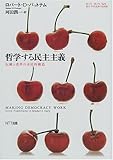ソーシャル・キャピタル論の考察(その一)
ソーシャル・キャピタルの定義は人によって違うし、定義している人がじゃあ道理の通った整理をしているのかというと意外にそうじゃないので、ソーシャル・キャピタルという概念を有効に活用するにはどうしたらいいのかを考察してみよう。
まずP.ブルデューの定義。
Social capital is the aggregate of the actual or potential resources which are linked to possession of a durable network of more or less institutionalized relationships of mutual acquaintance and recognition --- or in other words, to membership in a group --- which provides each of its members with the backing of the collectivity-owned capital, a “credential” which entitles them to credit, in the various senses of the word.” (Bourdieu, P., 1986, “The Forms of Capital,” J. G. Richardson ed., Handbook of Theory and Research for the Sociology of Education, Westport, CT: Greenwood Press, 241-5:pp. 248-249)
要するに「持続的ネットワーク(グループ)に参加していることから得られる資源」ってことですね。三田会に所属していることから得られるメリットみたいなもんかな。ただこれはブルデュー自身の議論からみてもあまりいい定義ではない。というのは、たとえば「慶應卒だから就職有利だった」というのと、「三田会のパーティでおいしい話を聞いてきた」ということはブルデューの中では違う。慶應大は入学で身分差別したりしないけど、三田会のメリットは排他的であることでおいしさを増すから。
次にコールマンの定義。
a variety of entities with two elements in common: They all consist of some aspect of social structures, and they facilitate certain action of actors --- whether persons or corporate actors --- within the structure (Coleman, J. S., 1988, “Social Capital in the Creation of Human Capital,” The American Journal of Sociology, 94: 95-120: S95.)
これは広すぎ。「ソーシャル・キャピタル=機能する社会構造」っていっているようなもの。これじゃ政府や市場もソーシャル・キャピタルになってしまう。コールマンの出している例は、コミュニティの安全とかですね。
パットナムの定義。
features of social organizations, such as networks, norms, and trust, that facilitate action and cooperation for mutual benefit. (Putnam, R. D., 2000, Bowling Alone: The Collapse and Revival of American Community, New York: Simon and Schuster.)
ネットワークも規範も信頼も、それが相互利益を生むとされれば、それはソーシャル・キャピタル。やっぱりちょっと広すぎかな。『哲学する民主主義』で触れられるイタリアの例では、市民の政治参加や社会的協力的態度(いわゆる「市民的伝統」)が経済発展の一因であった、とされている。他方で『ボーリング・アローン』では、近隣を含めた社会参加活動を考慮している。微妙な違いかもしれないが、スコッチポルの指摘はこの点で重要かもしれない。
We challenge the widely held view that classic American voluntary groups were tiny, local, and disconnected from government. ... Institutionalist theories suggest reasons for this parallelism, which belies the rigid dichotomy between state and civil society that informs much current discussion of civic engagement in the United States and elsewhere. (Skocpol, T., M. Ganz, & Z. Munson, 2000, “A Nation of Organizers: The Institutional Origins of Civic Voluntarism in the United States,” The American Political Science Review, 94(3): 527-46.)
ここらへんは、単に近隣の密な交流があるだけでは効果がない、とするR.サンプソンの主張と重なる。
Action depends on connections among organizations, connections that are not necessarily dense or reflective of the structure of personal ties in a neighbourhood. Our research supports this position... (Sampson, R. 2004. "Neighbourhood and community: Collective efficacy and community safety." New Economy, 11(2):106-113: 109.
犯罪抑止といった目的的活動にとっては、近隣同士仲が良いことは意味がなくて、直近の絆を超えて活動組織が連携できるかどうかにかかっている、ということ。これをSampsonは"collective efficacy"と呼んでいます。
で、最後にリンの定義は「ネットワークに埋め込まれた資源」。
It has been proposed that social capital, as an investment in social relations with an expected return in the marketplace, should be defined as resources embedded in a social structure that are accessed and/or mobilized in purposive actions. In this definition, three critical components present themselves for analysis: (1) the resources, (2) being embedded in a social structure, and (3) action. I contend that resources are at the core of all capital theories, especially social capital. A theory of social capital should accomplish three tasks: First, it should explain how resources take on values and how the valued resources are distributed in society - the structural embeddedness of resources. Second, it should show how individual actors, through interactions and social networks, become differentially accessible to such structurally embedded resources - the opportunity structure. Third, it should explain how access to such social resources can be mobilized for gains - the process of activation. (Lin, N. 2001. Social Capital: Theory of Social Structure and Action. Cambridge University Press. p.29.)
たとえば友人が自転車を貸してくれるとか、知人が仕事を紹介してくれるとか。これは一見スッキリするけど、実はよく考えるとそうでもない。
次のエントリでは、これらの定義や見方を踏まえてもう少し統一的な整理をしてみます。

哲学する民主主義―伝統と改革の市民的構造 (叢書「世界認識の最前線」)
- 作者: ロバート・D.パットナム,Robert D. Putnam,河田潤一
- 出版社/メーカー: NTT出版
- 発売日: 2001/03
- メディア: 単行本
- 購入: 5人 クリック: 42回
- この商品を含むブログ (39件) を見る

- 作者: ロバート・D.パットナム,Robert D. Putnam,柴内康文
- 出版社/メーカー: 柏書房
- 発売日: 2006/04
- メディア: 単行本
- 購入: 3人 クリック: 86回
- この商品を含むブログ (80件) を見る

- 作者: シーダ・スコッチポル,河田潤一
- 出版社/メーカー: 慶應義塾大学出版会
- 発売日: 2007/09/20
- メディア: 単行本
- 購入: 6人 クリック: 47回
- この商品を含むブログ (24件) を見る